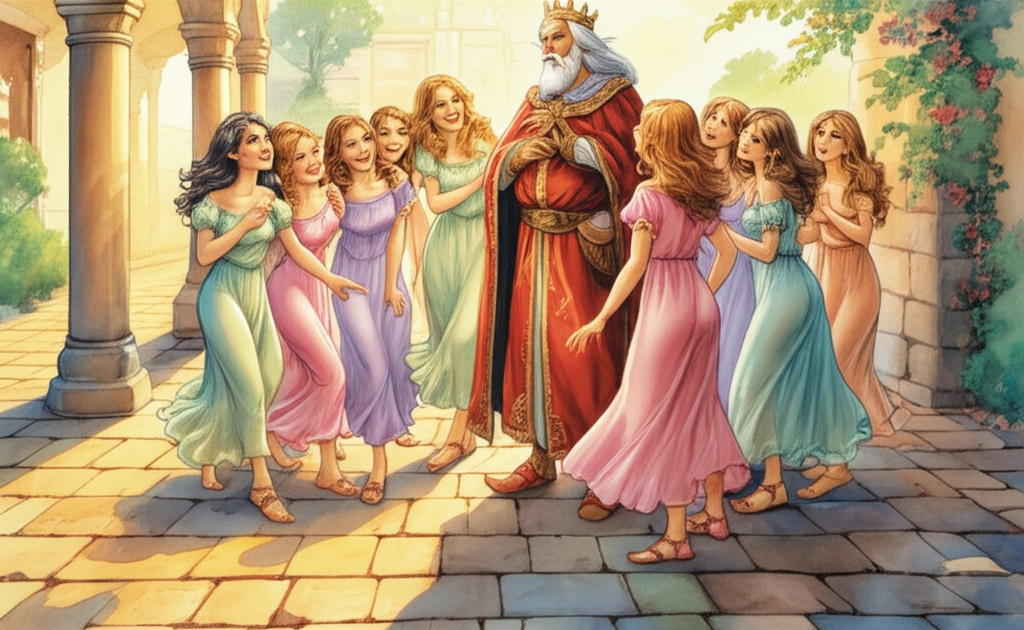
Once upon a time, in a land far away, there lived a king with a wife and seven daughters. One sunny day, the king called all his daughters together. He asked them, “My dears, who gives you your yummy food? And who says it’s okay for you to eat it?”
Six of his daughters replied, “Father, you give us our food! And you say it’s okay for us to eat it!”
But the seventh and youngest daughter said, “Father, God gives me my food! And I say it’s okay for me to eat it!”
This answer made her parents super mad! They yelled, “We don’t want our youngest daughter living with us anymore!” So, the king called some of his helpers and said, “Get a fancy chair ready! Put my youngest daughter in it. Then, take her far, far away into the jungle and leave her there!”
The helpers got the chair ready, put the princess inside, and carried her deep into the jungle. They set the chair down and said, “We’re going to get a drink of water!”
“Okay,” said the princess, “Now go home, like my father told you to!”
So, they left her all alone in the jungle and went back to the king’s house.
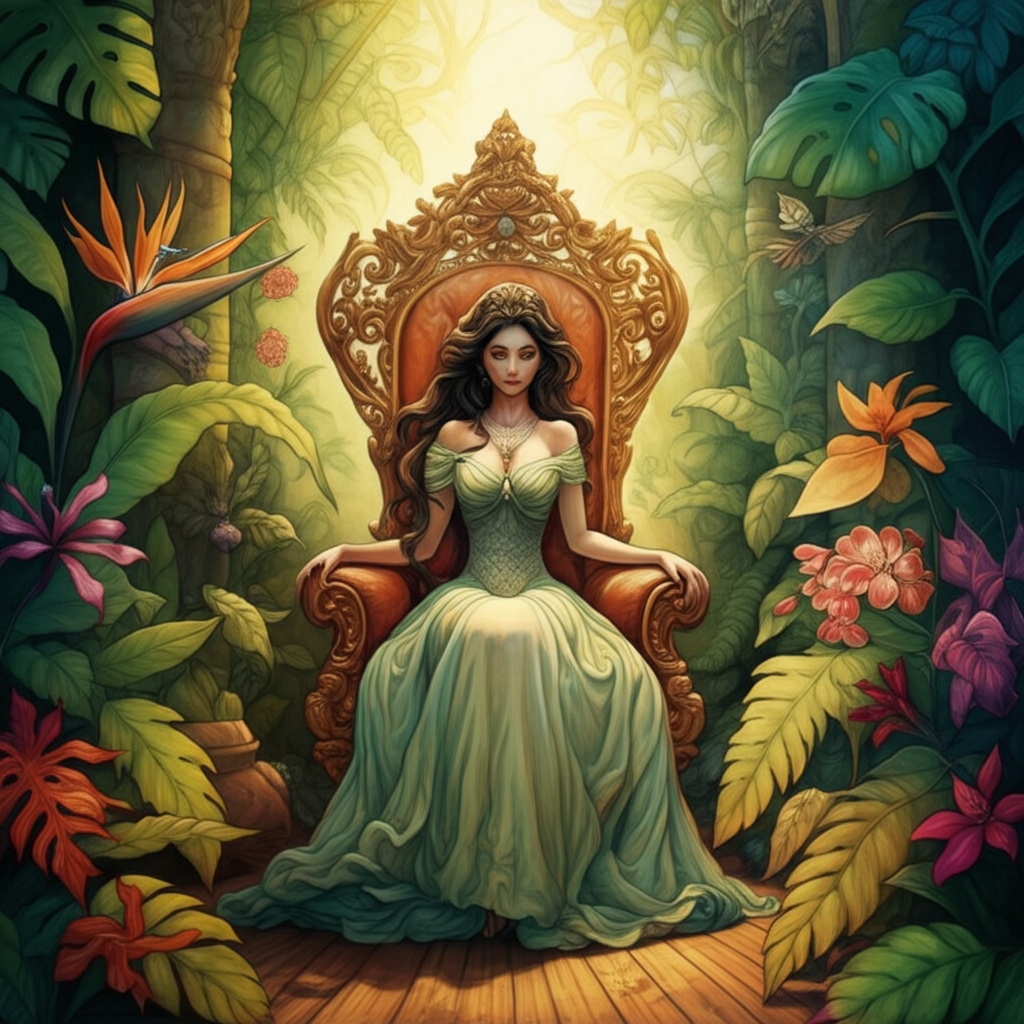
The princess prayed to God and thanked him. Then, she took a little nap in her chair. When she woke up, it was nighttime, and she found a jug of water and a plate of food in her chair! God had sent them to her while she was sleeping! She knew it was from God and thanked him again. She washed her face and hands with a little water, ate her yummy dinner, drank some water, and went back to sleep in her chair.
This little princess was always a very kind girl. She always did the right thing and was very good. That’s why God loved her so much! While she slept, God made a beautiful palace just for her in the jungle, right where she was sleeping! God even made a garden and a pond! When the princess woke up in the morning and got out of her chair, she saw the amazing palace with its pond and beautiful garden. “Wow!” she said. “I’ve never seen that palace before! It wasn’t here last night!”
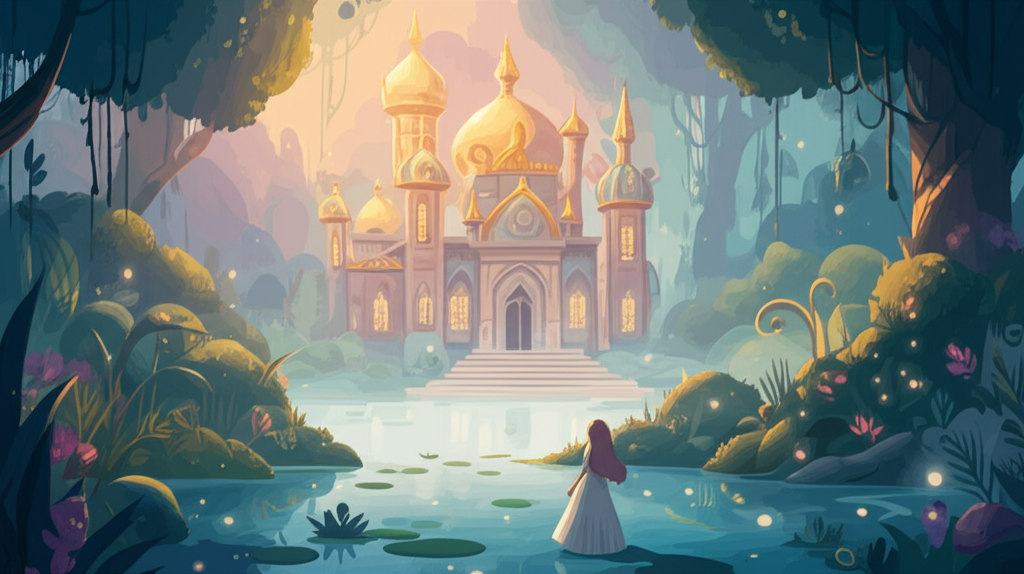
She walked into the garden, and helpers came to greet her. The palace was even nicer than her father’s! When she went inside, it was full of helpers. “Who does this palace belong to?” she asked. “It belongs to you!” they answered. “God made all this for you last night, and he sent us here to take care of you and be your helpers!” (And they were all normal people, not angels, that God had sent.) The princess thanked God and praised him.
A few days later, her father heard a rumor that a beautiful palace, garden, and pond had suddenly appeared in the jungle where he’d sent his youngest daughter! He also heard that she was living in the palace! The king said, “She was right! God gives us everything! I know he gave her that beautiful house!” But the king still didn’t go to see her.
One day, he thought, “Today, I’ll take a trip to another country! I’ll go by boat!” So, he ordered a boat to be made ready. Then, he went to his six older daughters and told them he was going away for a little while. “What would you like me to bring you from this other country?” he asked. “I’ll bring you anything you want!”
Some of them wanted sparkly jewels, like necklaces and earrings. Some wanted pretty silk fabric for clothes. Then, the king remembered his youngest daughter and thought, “I should ask her what she wants!” He called one of his helpers and told him to go to the jungle to his youngest daughter and say, “Your father is going on a trip to another country. He wants to know what you’d like him to bring you back!”
The helper found the princess reading her prayer book. He told her the king’s message. She said, “Wait,” because she wanted him to wait until she finished her prayers. But the helper didn’t understand and went back to the king right away. He told him, “Your daughter wants you to bring her ‘Wait’!”
“‘Wait’?” said the king. “What is ‘Wait’? Never mind, I’ll see if I can find any ‘Wait’! If I do, I’ll bring it back for her!”
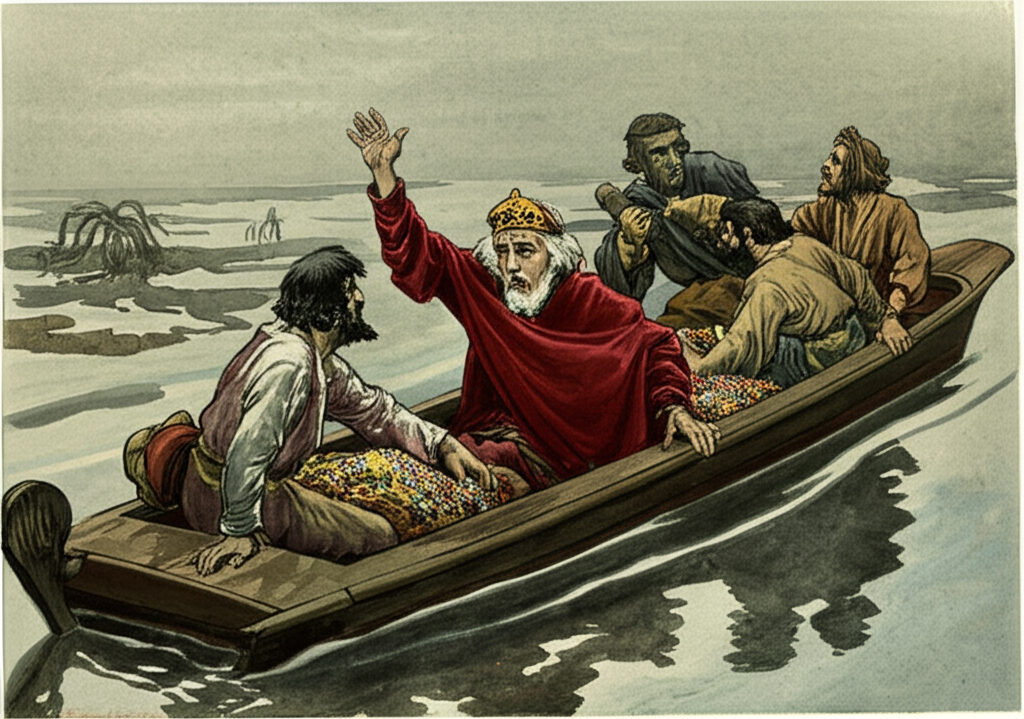
The king went to another country in his boat. He stayed there for a while and bought the jewels and silks for his six older daughters. When he was ready to go home, he got into his boat. But the boat wouldn’t move! He’d forgotten something! He’d forgotten the thing his youngest daughter had asked for!
Suddenly, he remembered he hadn’t gotten any “Wait!” So, he gave one of his helpers lots of money and told him to go into the town and find the “Wait.” He told him to give all the money for it.
The helper went to the town and asked everyone if they had “Wait” to sell. Then, he asked if they knew what it was. “No,” they said, “But our prince’s name is ‘Wait’! You should talk to him!”
The helper went to Prince Wait. “The king’s youngest daughter asked her father to bring her ‘Wait,’ and the king gave me lots of money to buy it for her! But I can’t find any, and no one knows what it is!”
The prince said, “Okay! Give this little box to your king, and tell him to give it to his youngest daughter. But only the princess who asked for ‘Wait’ can open the box!” Then, he told the man to keep the money as a gift from him.
The helper went back to the boat and gave the box to the king. He said, “The ‘Wait’ is in here!” And he told him Prince Wait said only the youngest princess could open it. Now the boat moved easily, and the king went home.
He gave his six older daughters the presents he had brought them and sent the little box to his youngest daughter. She said, “My father sent me this. I’ll look at it later!” Then she put it away and forgot about it. After a month, she found the little box and thought, “I’ll see what my father sent me!” She opened the box. Inside was a beautiful little fan! She was very happy! She fanned herself with it, and suddenly, a handsome prince was standing in front of her!
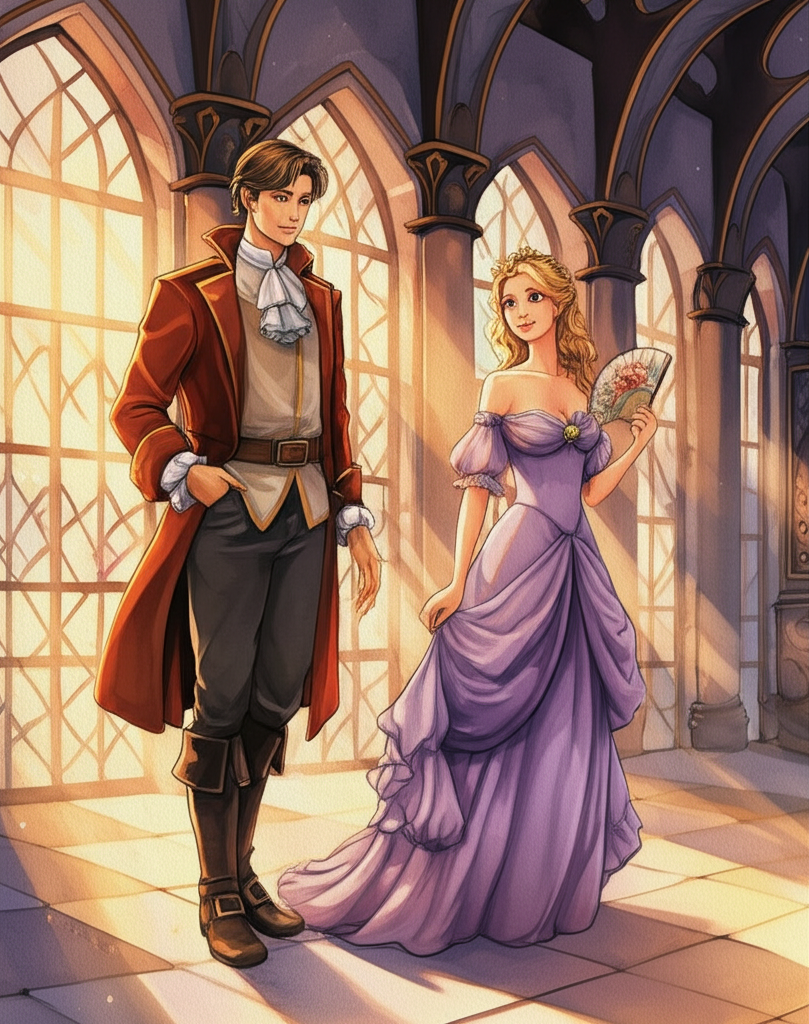
The princess was so surprised! “Who are you? Where did you come from?” she asked. “My name is Prince Wait,” he answered. “Your father came to my father’s country, and he said you asked him to bring you ‘Wait.’ So, I gave him this little fan for you. I have to come to whoever uses this little fan with the pretty side facing out. And when you want me to go away, you have to turn the fan around so the pretty side faces you, and then fan yourself with it!”
The princess said, “Okay! So, your name is Prince Wait?” They talked for a while. Then, she turned her fan around, so the not-pretty side was facing out, and she fanned herself with it. The prince disappeared!
This went on for a month. The princess would fan herself with the pretty side facing out, and Prince Wait would come to her. When she turned the fan around and fanned herself, he would vanish.
One day, the prince said to her, “I’d like to marry you! Will you marry me?”
“Yes!” she answered. Then, she wrote a letter to her father, mother, and six sisters. She said, “Come to my wedding! I’m going to marry Prince Wait!” They all came! Her father was very happy that she was marrying Prince Wait. He said, “I see it’s true that God loves my youngest daughter!”
On the day of the wedding, her six sisters said to her, “Today, we won’t let the helpers make your bed. We’ll make it ourselves!”
“I have plenty of helpers to make it,” she said, “but you can do it if you want!”
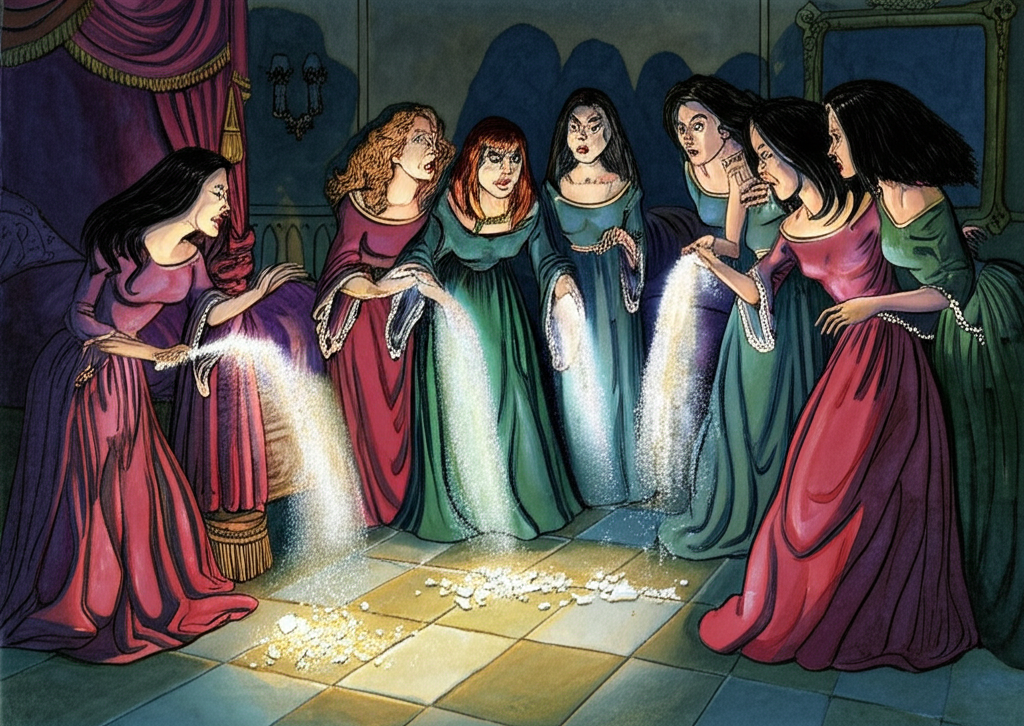
Her sisters went to make the bed. They took a glass bottle and smashed it into tiny pieces, making a powder. Then, they spread the powder all over the side where Prince Wait was going to sleep. They did this because they were jealous that their youngest sister was getting married, while they, who were older, weren’t married yet. They thought they should have gotten married first, since they had lived in their father’s palace and been taken care of, while she had been sent away to the jungle.
When the wedding was over, and Prince Wait and his wife had gone to bed, the prince became very sick because the glass powder was cutting his skin. “Turn your fan around and fan yourself quickly, so I can go home to my father’s country!” he told her, “I’m very sick and can’t stay here!”
So, she fanned herself right away with the fan turned around. Then, he went home to his father, and he was very sick for a long time. The poor princess didn’t know anything about the glass powder.
Her father, mother, and sisters went home after the wedding, leaving the princess alone in her palace. Every day, she turned her fan to the pretty side and fanned and fanned herself. But Prince Wait never came. He was too sick.
One day, she cried a lot and was very, very sad. “Why doesn’t my prince come to me?” she said. “I don’t know where he is or what happened to him!”
That night, she had a dream. In her dream, she saw Prince Wait lying very sick in his bed.
When she woke up in the morning, she knew she had to go and try to find her prince! So, she took off all her beautiful clothes and jewels and put on some old clothes. Then, she got on a horse and rode off into the jungle. No one knew she was a woman or that she was a king’s daughter. Everyone thought she was a man.
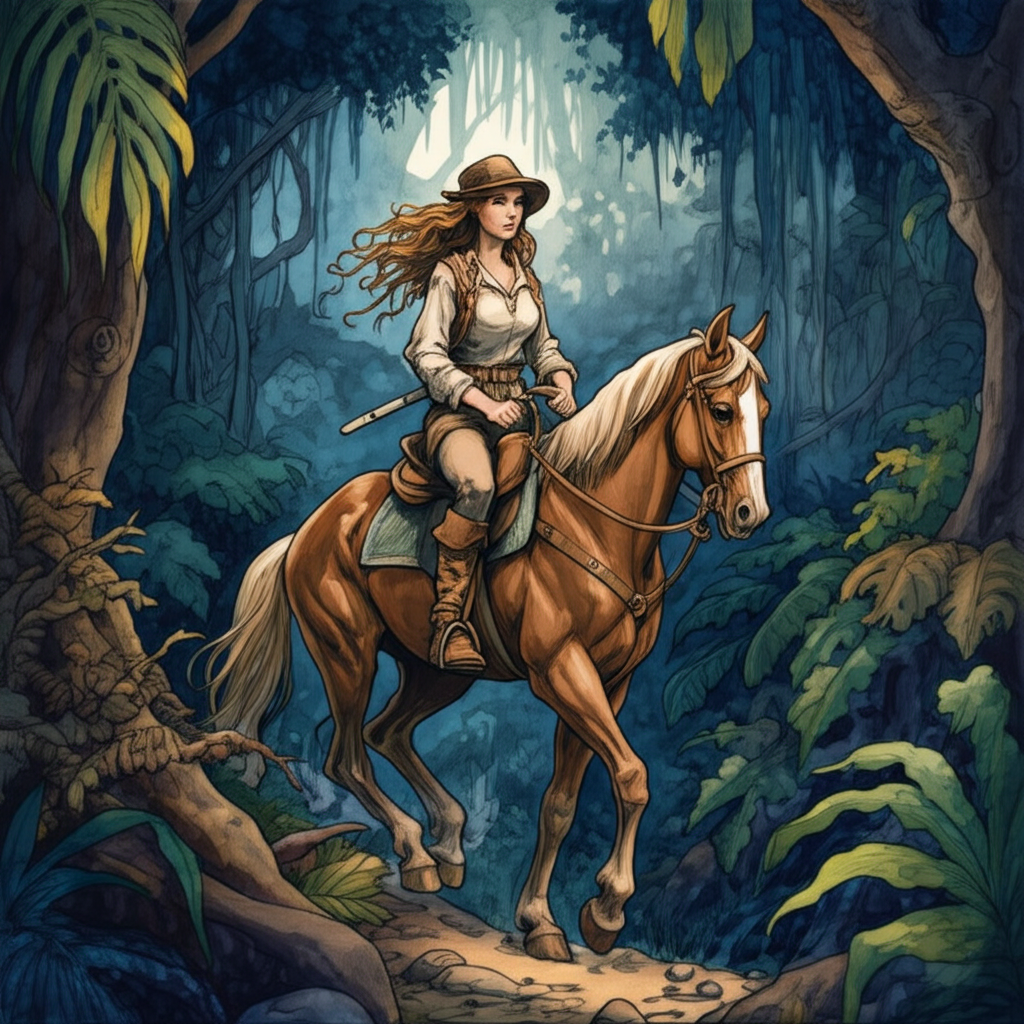
She rode on until nighttime and came to another jungle. She got off her horse, tied it to a tree, and lay down under the tree to sleep. At midnight, she was woken up by the chattering of a parrot and a bird, who came and sat on the tree, not knowing she was underneath.
The bird said to the parrot, “Parrot, tell me something!”
The parrot said, “Prince Wait is very, very sick in his own country. On the day he got married, the bride’s six sisters took a glass bottle and smashed it into powder. Then, they spread the powder all over the prince’s bed so it cut his skin. The glass powder has made him very sick!”
“What will make him well?” said the bird, “What will cure him?”
“No doctors can cure him!” said the parrot. “No medicine will do him any good! But if anyone slept under this tree and took some dirt from under it, mixed it with cold water, and rubbed it all over Prince Wait, he would get well!”
The princess heard everything! She got up and wished for morning to come. When it was day, she took some of the dirt, got on her horse, and rode off. She rode until she came to Prince Wait’s country. Then, she asked who the country belonged to. She was told it was Prince Wait’s father’s country, “But Prince Wait is very sick!”
“I’m a healer,” said the princess, “and I can cure him!” This was told to the king, Prince Wait’s father. “That’s wonderful!” he said. “Send the healer to me!”
So, the little princess went to the king, who said to her, “My son is very, very sick! Please make him well!”
“Yes,” she said, “I’ll make him well. Bring me some cold water!”
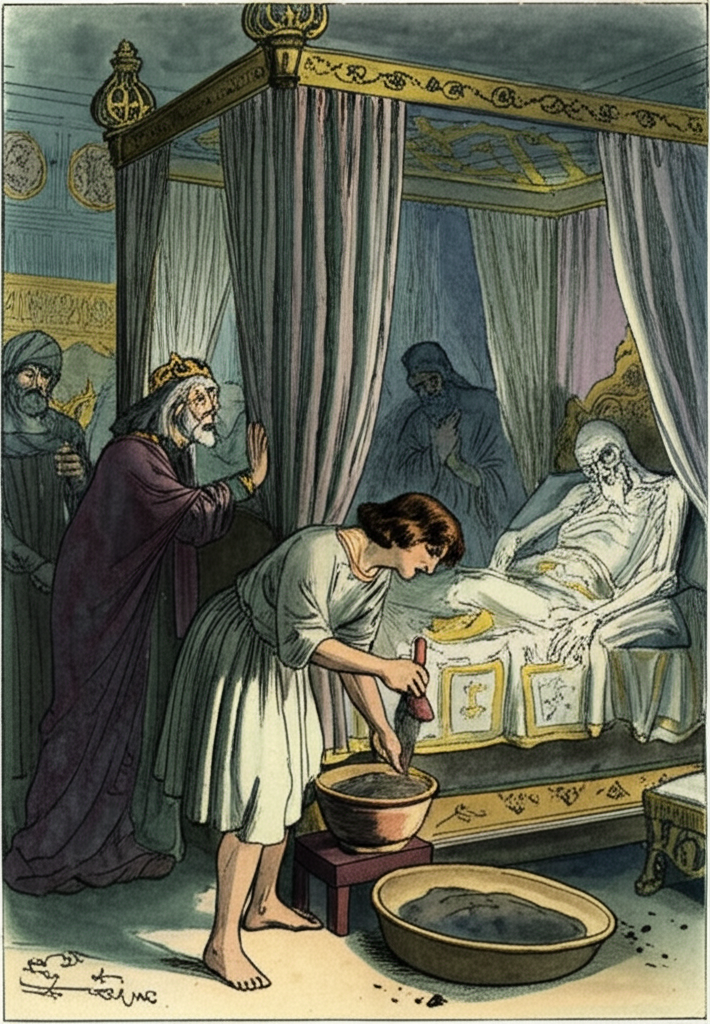
They brought her the cold water, and she mixed it with the dirt she had gotten from under the tree. She rubbed it all over the prince. For three days and nights, she rubbed him with it. After that, he got better, and in a week, he was completely well! He was able to talk and walk around as usual.
Then, the healer said, “Now, I’ll go back to my own country!”
But the king said to her, “First, you have to let me give you a present! You can have anything you want! As many horses, or soldiers, or money as you want! You made my son well!”
“I don’t want anything at all,” said the princess, “except Prince Wait’s ring and the handkerchief with his name on it!” She had given him both of those things on their wedding day. Prince Wait’s father and mother went to their son and asked him to give the handkerchief and ring to the healer. He did it happily. “Because,” he thought, “if it weren’t for that healer, I would never see my dear princess again!”
The healer took the ring and handkerchief and went home. When she got there, she took off the old clothes and put on her own beautiful clothes. Then, she turned her fan to the pretty side and fanned herself with it. Immediately, her Prince Wait was standing by her! “Why didn’t you come to me before?” she said. “I’ve been fanning and fanning myself!”
“I was very sick and couldn’t come,” said Prince Wait. “Finally, a healer came and made me well, and I gave him my ring and handkerchief as a thank you!”
“It wasn’t a healer!” said the princess. “It was me who came to you and made you well!”
“You!” said the prince. “Oh, no! It was a healer! You were sitting here in your palace while the healer came and cured me!”
“No, really,” she said. “I was the healer! See, isn’t this your ring? Isn’t this your handkerchief with your name on it?” Then, he believed her! She told him about her dream, her journey in the old clothes, the birds’ talk, and everything that had happened.
Prince Wait was very happy that his wife had done so much for him, and they lived happily ever after!